Commentary on 2 Chronicles 29:28
Verse: "And all the congregation worshipped, and the singers sang, and the trumpeters sounded: and all this continued until the burnt offering was finished."
The verse presents a vivid scene of worship in the temple, reflecting the spirit of dedication and reverence for God as the nation of Judah returns to proper worship after a long interval of neglect.
Introduction
2 Chronicles 29 reveals the early reign of King Hezekiah, who prioritized the restoration of the temple and the reestablishment of true worship among the people. After years of idolatry under previous kings, Hezekiah's actions marked a significant turning point in the spiritual life of Israel.
Worship as a Community Activity
Commentators like Matthew Henry emphasize that worship was not merely an individual experience; it was a communal event. The use of the phrases such as "all the congregation” underscores the collective participation of the people in worship.
-
Community Unity: The congregation’s involvement signifies a unified return to faith, demonstrating collective repentance and recommitment to God.
-
Shared Experience: Worship acts as a means of uniting the people under one faith and purpose, fostering a sense of belonging and identity in their relationship with God.
The Role of Music in Worship
This verse highlights the importance of music in worship, with singers and trumpeters playing a vital role. Albert Barnes points out that music has a powerful emotional impact that enhances the experience of worship.
-
Expression of Praise: Singing is an essential component of worship, reflecting the joy and reverence due to God. It serves as an expression of gratitude and adoration.
-
Connection to the Divine: The act of singing and playing music bridges the gap between the earthly and spiritual realms, drawing the congregation closer to God.
Significance of the Burnt Offering
The burnt offering signifies complete dedication and atonement. Adam Clarke notes that this act symbolizes total surrender to God, with the entire offering consumed by fire, representing an unreserved offering to Him.
-
Atonement: The burnt offering serves as a reminder of the need for atonement for sin, an essential aspect of the restored relationship between God and His people.
-
Dedication: By prioritizing the burnt offering, Hezekiah demonstrates the importance of dedicating oneself and the community to God, restoring their covenant relationship.
The Continuation of Worship
The phrase "and all this continued until the burnt offering was finished" underscores the importance of perseverance in worship. True worship requires commitment and continuity, as noted by Matthew Henry.
-
Persistence in Worship: The act of worship did not conclude abruptly; the commitment of the people reflects the required perseverance necessary in a true relationship with God.
-
Ongoing Relationship: Worship should be a continuous aspect of life, not limited to ceremonial practices. The people’s dedication underscores their desire for a lasting relationship with God.
Lessons for Today’s Congregations
The events of this passage provide critical insights for contemporary worship within the church. As noted by various theologians:
-
Importance of Unity: Modern congregations are encouraged to embrace communal worship, understanding the strength found in unity and shared praise.
-
Value of Music: Worship leaders should recognize the power of music as a tool for engagement and spiritual elevation during services.
-
Commitment to Worship: Believers are called to view worship as an ongoing lifestyle rather than a series of events, fostering a culture of worship within their communities.
-
Significance of Sacrifice: Understanding that true worship often involves personal sacrifice, be it time, offerings, or lifestyle changes, in dedication to God.
Conclusion
In summary, 2 Chronicles 29:28 encapsulates a moment of profound communal worship, marked by music, sacrifice, and the returning of a people to their God. The insights from public domain commentaries enhance our understanding of this passage, offering rich lessons pertinent to individuals and faith communities alike. The earnest worship of the Israelites under Hezekiah serves as an enduring model for contemporary believers, emphasizing unity, sincerity, and the importance of continuous relationship with the Divine.


